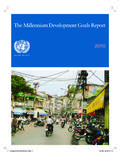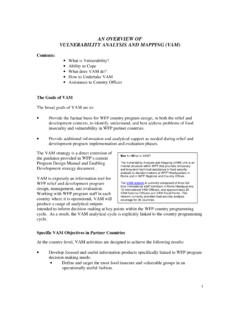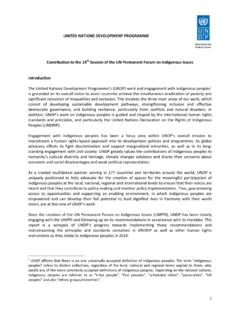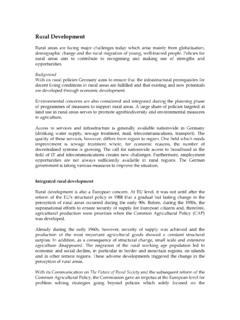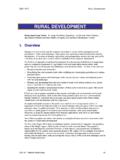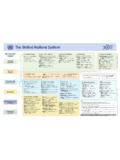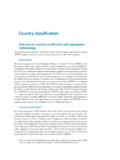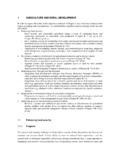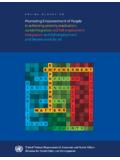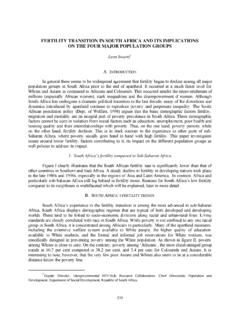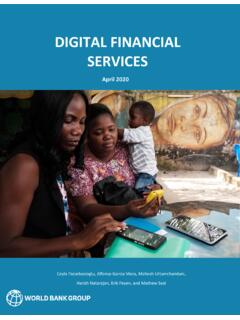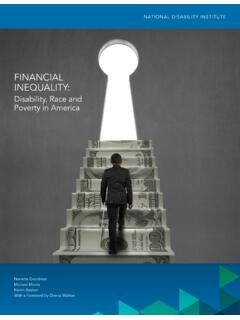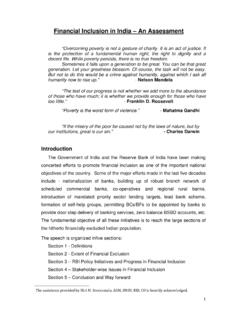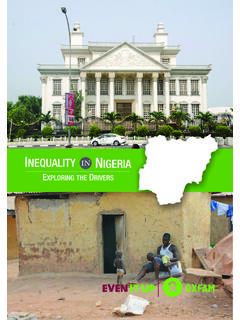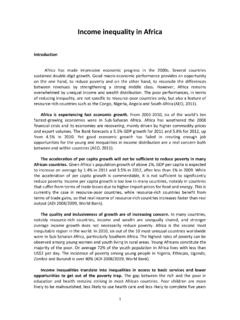Transcription of Social protection: A development priority in the post-2015 UN ...
1 Social protection: A. development priority in the post-2015 UN development agenda Thematic Think Piece ECA, ILO*, UNCTAD, UNDESA, UNICEF. The views expressed in this paper are those of the signing agencies and do not necessarily reflect the views of the United Nations. May 2012. *The views expressed in this paper are reflections of ILO senior officials identified to assist the UN. System Task Team and do not necessarily reflect the views of the ILO. Following on the outcome of the 2010 High-level Plenary Meeting of the General Assembly on the Millennium development Goals, the United Nations Secretary-General established the UN System Task Team in September 2011 to support UN system-wide preparations for the post-2015 UN development agenda, in consultation with all stakeholders.
2 The Task Team is led by the Department of Economic and Social Affairs and the United Nations development Programme and brings together senior experts from over 50 UN entities and international organizations to provide system-wide support to the post-2015 consultation process, including analytical input, expertise and outreach. 2. Social protection: A development priority in the post-2015 UN development agenda 1. Introduction 80% of the global population has no access to comprehensive Social protection. Social protection programmes tackle multiple dimensions of poverty and deprivation (decent work, education, health care, food security, income security) and can therefore be a powerful tool in the battle against poverty and inequality .
3 Social protection can play a fundamental role in creating more inclusive and sustainable development pathways. In the absence of Social protection, people, especially the most vulnerable, are subjected to increased risks of sinking below the poverty line or remaining trapped in poverty for generations. Social protection is an important instrument for the pursuit of at least six of the eight present MDGs by ensuring universal access to key essential services in quality basic and maternal health care, education, nutrition and environmental health. However, the importance of Social protection for equitable progress as mapped out by the MDGs has been recognized in full only recently. Indeed, advantage in access to decent work and Social security has been an important reason why better-off nations and population groups achieved stronger progress between 1990 and 2005 than did countries and people with weak access to equitable growth and Social protection.
4 The post-2015 UN development agenda requires a new approach to international and national development , taking the multiple interlinked global challenges that exist even more into account. It is therefore of paramount importance that, in view of the multiple roles that Social protection can play in Social and economic development , the post-2015 UN. development agenda will acknowledge the critical role extending adequate Social protection plays in furthering key outcomes, ensuring the inclusion of all groups in development and society as a means to combat inequality , vulnerability and poverty . The post-2015 debate needs a renewed and comprehensive focus on poverty , inequality , income distribution and Social inclusion .
5 Fiscally sustainable Social protection schemes based on strong legal and 3. regulatory frameworks should be an integral component of national development strategies to achieve inclusive, equitable sustainable development . The objective of this document is to underpin this argument, while proposing concrete post- 2015 goals related to Social protection and associated indicators that allow measuring progress. 2. Challenge and policy context Wherever Social protection systems with wide population coverage and adequate and affordable benefit levels are in place, they have been effective in reducing poverty and inequality as well as promoting economic and Social development at large. Successes in expanding Social protection in an increasing number of middle and low income countries, as well as evidence from multiple quantitative analyses in other developing countries,1 have shown that basic levels of Social protection are affordable.
6 Consequentially they are increasingly being perceived as tangible Social policy instruments that can achieve Social and economic outcomes, inter alia through income redistribution mechanisms and transfers and behavioral incentives that facilitate labour market adjustments. During the present financial and economic crisis Social protection systems have shown their potential to strengthen households' capacity to cope, as well as mitigate against the Social and economic fallout of the crises. Consequently, Social protection has experienced a renaissance in the global development policy discourse. Prominent evidence is provided by the Social Protection Floor Initiative, which was launched by the United Nations system Chief Executives Board for Coordination in 2009 and endorsed by the UN General Assembly during its MDG Summit of September 2010.
7 It supports countries in their efforts to provide access to essential Social services and Social transfers. National Social protection floors will help to prevent and reduce poverty and Social exclusion, and will contribute to the Social , economic and environmental dimensions of sustainable development . The important role of Social protection, in 1 International Labour Organization, Can low- income countries afford basic Social security? (Geneva, 2008), available at: 4. particular the role of national Social protection floors, in national Social and economic development has over the last few years been recognized by a number of further international bodies and fora, such as OECD DAC, ECOSOC, the EU, the G20 Labour and Employment Ministers' Meeting and Summit in November 2011, and lately the UN.
8 Commission for Social development resolution adopted in February 2012. In summer 2011. the tripartite constituents of the ILO have chosen the symbolic opportunity of the 100th Session of the International Labor Conference to reconfirm the role of Social security as a human right and a Social and economic necessity for countries at all levels of development . Consequently, a new a new international standard on national Social protection floors will be discussed in the 101st Labour Conference in June 2012. At the same time several major international agencies, such as the EC, the World Bank, the World Food Programme and UNICEF are launching or just have launched new Social protection And yet, a fundamental global policy challenge remains.
9 Nearly 80 per cent of the global population presently has no access to comprehensive Social protection that enables people to cope with life risks. This is a challenge that the international community must address when defining the global post-2015 development agenda. 2. The Role of Social protection in inclusive development The post-2015 agenda faces the challenge of adopting a new approach to international and national development , one that addresses the multiple interlinked global challenges of poverty eradication, environmental sustainability, economic equity, gender equality, climate change, resilience, equitable distribution of resources, human rights and inequality . It will be critical to building resilience and to mitigating the impact of shocks not just on the poor, but on societies as a whole, and to secure recent gains in poverty reduction and political stability achieved in many developing nations.
10 2 World Bank, Resilience, Equity, and Opportunity, The World Bank's Social Protection and Labour strategy 2012-2022 (Washington , 2012); United Nations Children's Fund, Social Protection Strategic framework (New York, 2012); and World Food Programme, Update of WFPs' Safety Nets Policy (Rome, 2012). 5. We have learned that international goals defined on the basis of national aggregated data will not automatically include equitable solutions for all. Equality and solidarity, core values and objectives in the Millennium Declaration,3 did not receive sufficient emphasis in the MDG agenda. Measured progress towards the MDGs has often not brought about a narrowing of the welfare differences within countries, and is often concealing widening Social inequalities.
